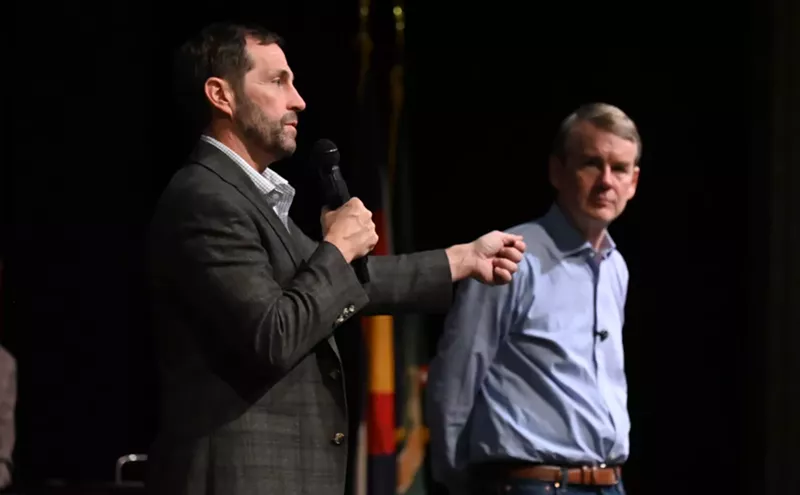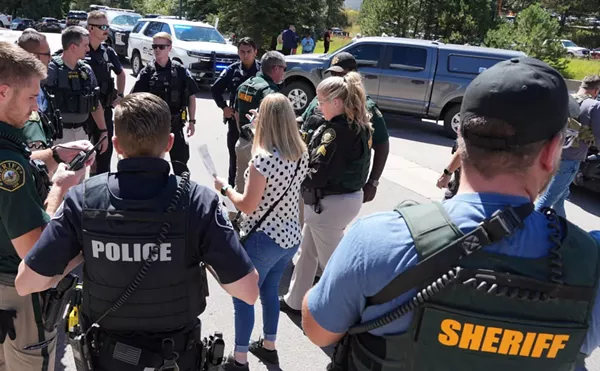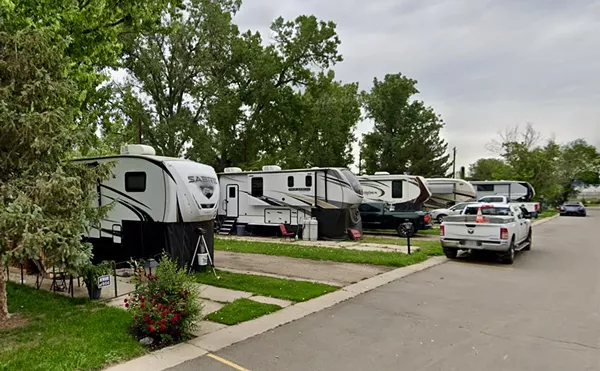The study, on view below in its entirety, puts its grabbiest stat in its title: "210,000 Marijuana Possession Arrests in Colorado." Here's a graphic showing the year-by-year breakdown, which cover the span between 1986 and 2010:
And here are what study authors Harry Levine, Jon Gettman and Loren Siegel characterize as their "key findings:"• Marijuana possession arrests in Colorado increased from 4,000 in 1986 to over 10,000 in 2010, totaling 210,000 arrests over the past 25 years.Levine, a professor of sociology at the City University of New York's Queens College and co-director of the nonprofit Marijuana Arrest Research Project, speaks frankly about the report's release date.• In the five years from 1986 to 1990, police in Colorado made 19,400 possession arrests. Twenty years later, from 2006 to 2010, police made 55,900 marijuana possession arrests, almost three times as many.
• From 2001 through 2010, Colorado police made 108,000 arrests for possessing marijuana, overwhelmingly of young people. More than two-thirds (69 percent) of those arrested were 25 or younger, 79 percent were 29 or younger, and 86 percent of those arrested were age 34 and younger.
• Whites, mainly young whites, made up 63 percent of those arrested in the last ten years. Blacks and Latinos, also mostly young, were 36 percent of the arrestees.
• Although young African Americans and Latinos use marijuana at lower rates than young whites, in the last ten years police in Colorado arrested Latinos at 1.5 times the rate of whites and arrested blacks at 3.1 times the rate of whites.
• In the last decade, blacks were 3.8 percent of Colorado's residents, but 10.5 percent of the marijuana arrests. Latinos were 19 percent of the state's residents, but a quarter (25 percent) of Colorado's marijuana possession arrests.
• Marijuana possession arrests create criminal records easily found on the Internet by employers, landlords, schools, credit agencies, licensing boards and banks, erecting barriers to education, employment and housing. Marijuana possession arrests do not reduce serious crimes, and they take police from other crime-fighting work.
• Colorado is often said to be a marijuana decriminalization state, but since the 1970s, Colorado law has made possession of small amounts of marijuana a crime, a Class 2 Petty Offense. Failure to appear in court as ordered by a summons is another crime, punishable by six months in jail and a $500 fine.
• In county courts, marijuana possession carries a $100 fine. In municipal courts, however, judges can impose fines of $300 or more, change $50 per month in probation fees, require regular drug testing, and send people to jail for several days if they have used marijuana.
"Of course this is timed to the amendment," he says from New York. "It helps us to get attention for what we regard as a national scandal. This is what we do: We try to call attention to what we think is a nationwide scandal about marijuana possession arrests and the collateral consequences."
Continue to read more of our interview with Harry Levine and see the complete study. As Levine notes, the fallout from marijuana arrests can be significant and long-lasting."People wind up with criminal records that go into the FBI database, and into state and commercial databases that are available on the Internet," he says. "Twenty years ago, these kinds of petty crime records were kept in the basement of courthouses. But ten years ago, they got computerized, and now they're instantly available. People can pay $20, $12, sometimes even nothing at all, to do background searches with just a phone number, an address, a Social Security number. And these checks are used by employers -- all the big box stores, chains, banks, credit agencies, schools, colleges.
"Really nasty things can happen with professional licenses, too," he goes on. "Licenses for things like daycare workers and teachers and nurses and home health-care attendants that require a clean criminal record. And these things show up as drug offenses that are especially stigmatizing for those kinds of jobs. People get notified that their license has been suspended pending satisfactory resolution of the matter, and those kinds of things can take months to work out. And now, this person has a criminal case to figure out and may not even have a job, all for a petty offense."
And then there's the social-justice aspect of such busts, which "target the most vulnerable people," Levine maintains. "In Colorado, over 80 percent of those arrested are under 35, and blacks and Latinos are disproportionately targeted. In Colorado, Latinos are 19 percent of the population, and in the last ten years, they represent 25 percent of the arrests. And blacks are getting arrested at nearly triple their percentage of the population. Together, blacks and Latinos make up 23 percent of the population, but they're 36 percent of the people arrested for marijuana."
Caucasians make up the larger piece of the marijuana-possession-arrest pie, Levine acknowledges, but "the majority arrested are not upper-middle-class white people," he maintains. "This thing falls overwhelmingly on low-income people of all races."
For that reason, he goes on, "the social justice issue is pretty transparent as far as we're concerned, and so are the effects of treating drugs not just as a criminal-justice issue, but as a moral issue. The language of the war on drugs has always been a moral language -- that they're evil."
To Levine, however, such terms are better reserved for the drug war itself, which he characterizes as "an economic criminal-justice and moral catastrophe."
The press event introducing the student takes place at 10 a.m. at the Denver Press Club, 1330 Glenarm Place. Here's the complete study.
More from our Marijuana archive: "Medical Marijuana Industry Group likes not always flattering Newsweek 'pot barons' article."












